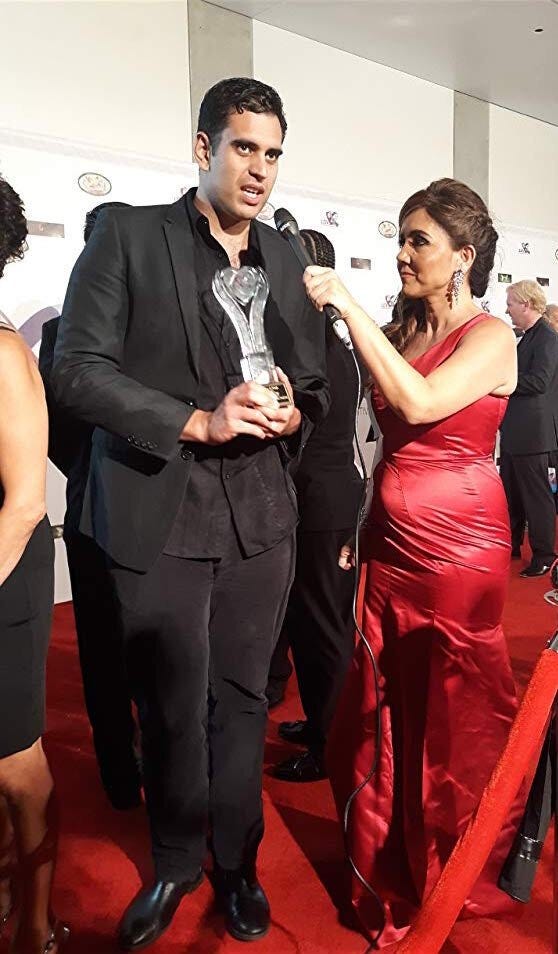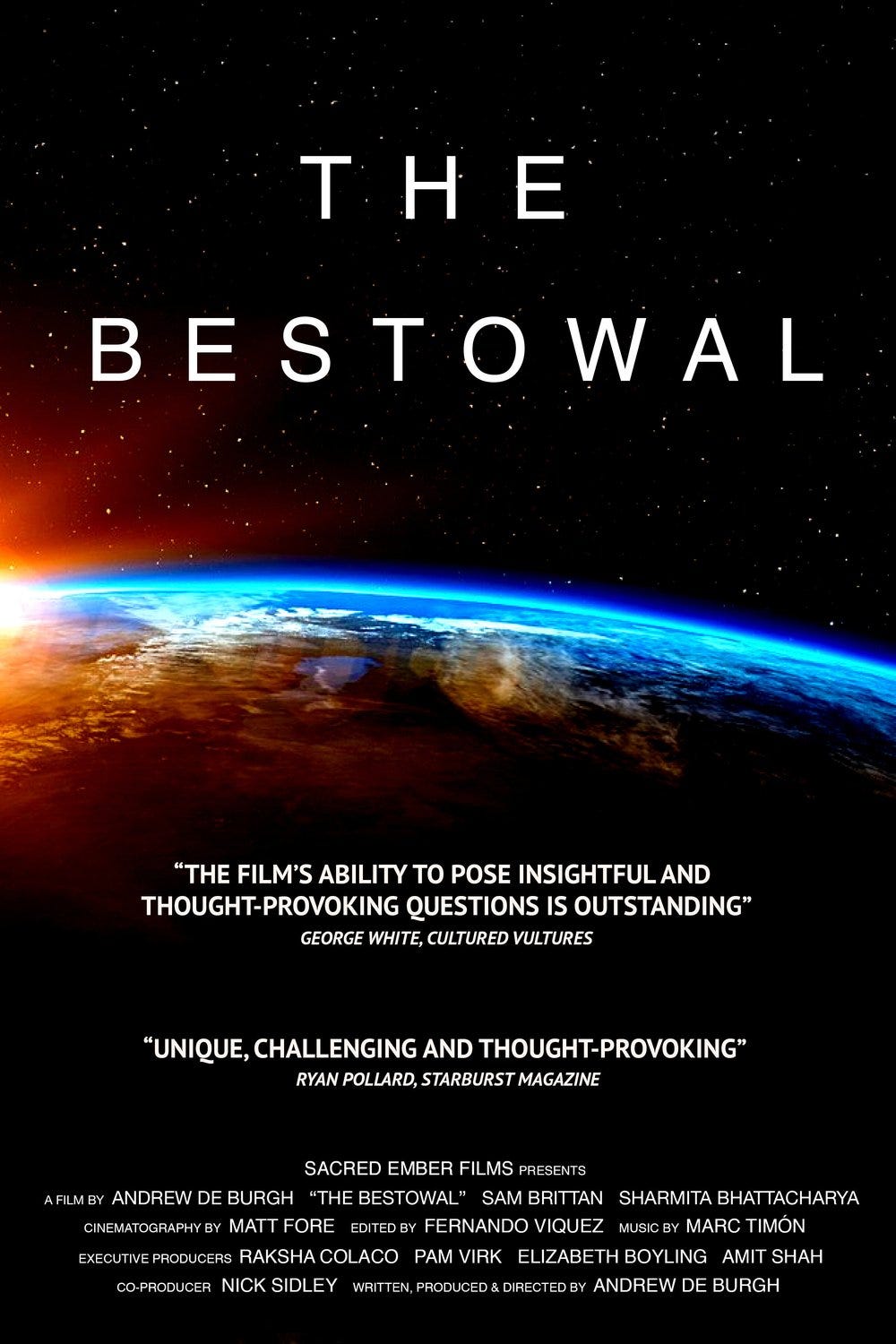Interview: "The Bestowal" Director Andrew de Burgh
Ariana Grande wants us to believe “God Is a Woman,” but in Andrew de Burgh’s first feature film, The Bestowal, it is Death who is female. The character visits a suicidal man for one very intriguing conversation about life itself.
What was your overall budget for the film? Was the budget the reason you worked with two people?
I’d rather not disclose the budget but I will say that it wasn’t a lot relative to most independent feature films. Aside from budget limitations, one of the reasons I wanted to work with two actors (Sam Brittan, Sharmita Bhattacharya) is that I traditionally prefer smaller casts as it gives me an opportunity to really work with actors to hone their character's motivations, mannerisms and back stories. I almost gave an actor a cameo as a Carer but decided against it during the shoot. I wanted to focus on the personal and intimate journey of these two characters and anyone else being seen on screen held the risk of diluting their chemistry.
Having not seen the film but knowing it is science fiction, how much of this is other worldly in what we physically see? Do we have any special effects?
In terms of what the audience sees, there is hardly anything otherworldly; the sci-fi lies purely in the imagination. For example, in one of the Acts, Death has a monologue about traveling to the 17th dimension and meeting another life force there. Another one of Death’s lines is, “There are forces and beings in this Universe that even God can’t comprehend. There are omni-present beings that have always existed but at the same time have never existed… like love”. The audience is encouraged to imagine these concepts. Like 'Interstellar' and '2001: A Space Odyssey' (major inspirations) I wanted to create a narrative that the audience would think about long after the credits roll. In terms of special effects, I don’t want to discuss it too much as it would be a spoiler but there is actually only one special effect and it’s in the final shot of the movie!
What is the overall message of suicide you want audiences to have with the film?
Thanks for asking this. For me, suicide prevention has long been an issue I have been passionate about discussing and trying to showcase in my films. In fact, the first student film I ever made (in 2009) was about suicide on college campuses. Suicide in the United States has risen a lot over the years and this is something that deeply disturbs me. As such, I wanted to create a compelling narrative in which people could see that despite the fact that someone may be suicidal, there is still a great deal of hope for them to recover and live a fulfilling life. One of the film's goals is to inspire hope and courage in the face of adversity.
According to the National Center for Health Statistics, from 1999 through 2017, the US suicide rate increased by 33%. As idealistic as it may sound, I truly wish I could wave a magic wand and eliminate suicides worldwide once and for all. ‘The Bestowal’ was a movie I wanted to make to show people that things truly can get better; it is absolutely crucial to never lose hope. In my opinion, one of the ways the suicide rate can go down is if everyone works together towards creating a more empathetic society and truly realizing that we are all equal human beings, regardless of race, religion or socioeconomic status.
Did you work with religious themes from any one religion for this, or were you writing from the perspective of anti-religion?
I was writing from both perspectives. Due to a lot of the film being a debate between the two main characters, one of whom is an atheist and the other a believer in God, there are religious themes from both Christianity and Buddhism as well as atheistic arguments. Also, due to there being both arguments for and against it in the film, I would consider it neither pro nor anti-religion but rather something that can incite lengthy discussions.
Does the lead character have anything relatable to be depressed about, or is he of the scenario some people find themselves in, seeing their situations as worse than they actually are?
The lead character Steven has achieved part of the American Dream. He is financially well off, has a great career and lives in a beautiful house. However, he lacks companionship, friends, suffers from depression and is disillusioned that everyone he works with cares solely about making as much money as possible even if it comes at the expense of other people.
He is also traumatized from an earlier incident in his life in which one of his best friends and former college classmates Derek Urden, despite a great education, work ethic and vast amounts of talent took his own life because everything in a career and financial sense went wrong for him.
Steven lives with the guilt that he succeeded at a career simply because his family was very well connected and set him up with a high paying job as soon as he graduated college. The film is definitely a criticism of meritocracy, something I consider (from years of life experience) to be a total facade. Who one is born to, who one is connected to etc. can vastly change one’s fortunes in life. Despite what people may think, studies have consistently shown that society is not in fact meritocratic.
Why did you want to make Death a woman?
Traditionally, Death in cinema has been portrayed as a Grim Reaper-esque figure and I wanted to break away from that and make Death a beautiful, young woman to completely subvert people’s preconceptions about the character. Sharmita Bhattacharya plays an empathetic and gentle version of Death who also helps people find their purpose in life.
Is she really Death, or does she represent something else that involves taking people away but isn’t the form of Death we think of in pop culture?
She represents both actually. She technically is an inter-dimensional incarnation of Death but she only takes people when their time is up, not at all out of malice but more out of necessity. In terms of the world in which the film lives, she is not the only embodiment of Death, but rather one incarnation of it and definitely not the form of Death people think of in pop culture.
What are your plans for finding this movie a home online so people can watch it?
I am very grateful to say that I am working with Indie Rights on distributing the film on various VOD platforms. To the people reading this, please follow our pages to stay updated on our release and thanks in advance for the support!




